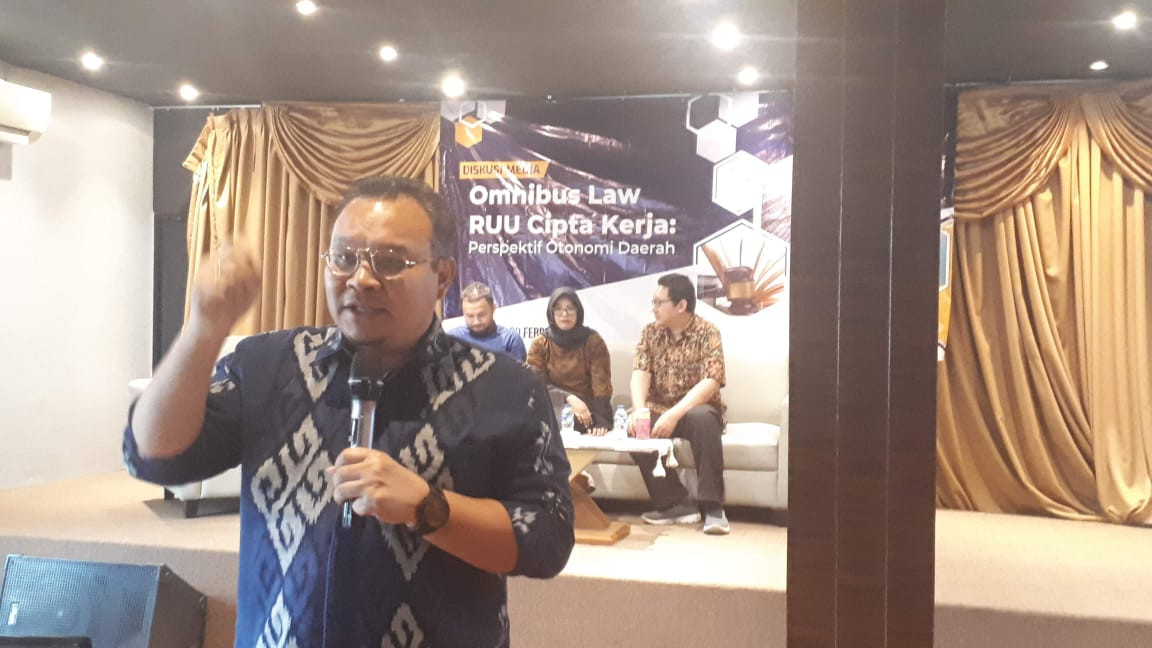Popular Reads
Top Results
Can't find what you're looking for?
View all search resultsPopular Reads
Top Results
Can't find what you're looking for?
View all search resultsOmnibus bill to diminish local governments' authority over spatial planning: KPPOD
According to Jakarta-based think tank Regional Autonomy Watch (KPPOD), instead of improving the process for starting a business, the bill will confuse prospective entrepreneurs.
Change text size
Gift Premium Articles
to Anyone
Eisya A. Eloksari
The Jakarta Post/Jakarta
The omnibus bill on job creation will weaken regional administrations by taking away their authority over the use of space and environmental impact analyses (Amdal) and putting in solely in the hands of the central government.
According to Jakarta-based think tank Regional Autonomy Watch (KPPOD), instead of improving the process for starting a business, the bill will confuse prospective entrepreneurs.
“These new regulations obscure the role of local governments,” KPPOD researcher Herman Suparman said during a seminar on the omnibus law as seen through the perspective of regional administrations on Feb. 20.
“At present, potential business owners go to the regional government to approve their Amdal. Later, it would have to coordinate everything with the central government.”
He added that this would only complicate bureaucracy and lengthen the process of creating a business.
According to Article 16 of Chapter III in the omnibus law, which is about improving investment ecosystems and business activities, businesses can submit a request for the use of space with the central government if the local administration does not have a detailed spatial plan (RDTR).
However, Herman said that from the 514 regencies and cities in the country, only 53 had an RDTR. This means that the central government will handle the approval of Amdal documents for more than 400 regencies and cities.
“The central government will also decide the risk level of businesses, although it is actually the local governments that understand the risk and impact of business activities in their areas.”
The bill will also revise Law No. 26/2007 on spatial planning, allowing the central government to issue a presidential decree when there is an overlap in the use of land, forest areas or permits.
The bill will also amend Article 23 of Law No. 32/2009 on environmental protection. The omnibus bill states that only businesses that have “a major impact on the environment, social, economic and culture” will require an Amdal.
Further criteria regarding what constitutes a “major impact” will be determined by a government regulation (PP).
Environmental impact assessments will also be conducted by the central government and it can delegate certified institutions or experts to carry out the job, replacing the role of Amdal assessment committees, which comprise the environment agency, related technical institutions, environment and technical experts, environmental organizations and public representatives.
“We are not sure that Indonesia has enough certified Amdal assessment institutions,” Herman said.
Meanwhile, KPPOD executive director Robert Endi Jaweng said the omnibus bill on job creation would reduce regional governments’ power to manage their own regions.
Furthermore, he said, the central government usually did not understand the situation that occurred in the regions.
“What is left for the regional government to do?” he asked during the seminar. “With Indonesia's vast territory, it will be difficult if all matters related to licensing are taken over by the central government.”
He expressed doubts that the central government had the capacity to handle all the tasks stated in the bill.
Robert suggested that during the bill’s deliberation in the House of Representatives, legislators should make changes that would distribute the responsibilities between the central and regional governments to ensure decentralization.
“I think there is no need for a target on when this bill should be passed if it means sacrificing the quality of the regulations,” he said, adding that he predicts the bill would be passed later this year.
The omnibus bill on job creation will amend 73 laws and consist of 15 chapters and 174 articles. Businesspeople have long complained about Indonesia’s overregulated business environment, which involves 43,511 central government regulations.










